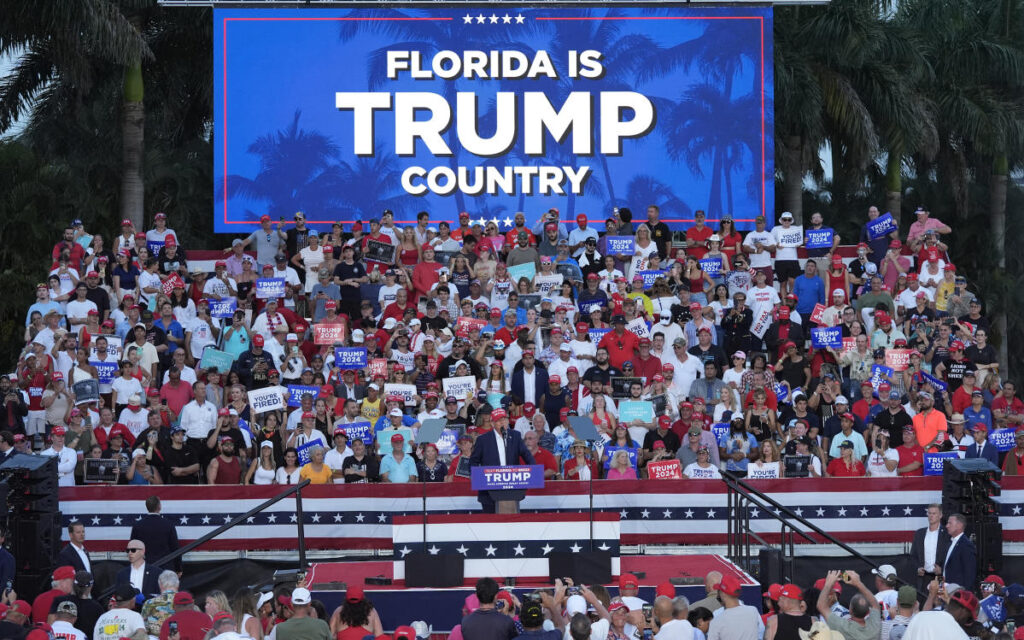Donald Trump’s adoption of Florida as his home state marks a significant shift in his political strategy as he embarks on a second administration. His newly formed team is predominantly composed of key figures from Florida, including trusted allies such as Susie Wiles as chief of staff, Marco Rubio as a likely Secretary of State, and Pam Bondi appointed to lead the Justice Department. This selection illustrates Trump’s preference for loyalty among his longstanding supporters over the need to appeal to various factions within the Republican Party. As he prepares to reenter Washington in two months, the infusion of Floridians into his administration suggests a potentially more aggressive and combative approach compared to his previous term. POLITICO reporters reflect on how this change will redefine the political landscape as Trump seeks to realize his vision for America.
The influx of Florida operatives into Trump’s administration is not merely about proximity to his residence in Mar-a-Lago but also highlights the long-standing relationships he has cultivated over the years. Trust and loyalty remain Trump’s central tenets when selecting his team. Journalists emphasize this point, indicating that these appointments reflect a shift in the Republican Party’s center of gravity from traditional powerhouses like Texas to Florida. This shift indicates a cultural change rooted in Florida’s unique political landscape, which often eschews risk aversion and embraces a more audacious approach to governance — traits that resonate well with Trump’s personality and political strategy.
As Trump prepares for his second act, the appointment of seasoned Florida operatives suggests a potential overhaul of Washington politics. Susie Wiles, who has mentored many in Florida’s political scene, is set to influence the administration’s direction, bringing a distinctly Floridian ethos to federal governance that may challenge the status quo. The dynamics of Florida’s political identity, infused with a sense of unpredictability and readiness to disrupt conventional practices, may lead to a new style of governance that prioritizes loyalty and aligns closely with Trump’s agenda, unlike the more traditional factions within the Republican Party.
Despite the increase in Florida’s political clout, the state itself currently lacks significant representation in top congressional leadership roles, complicating its newfound prominence. Florida Republicans are gradually realizing that many of their ranks are looking toward administration roles rather than seeking to ascend through Congressional ranks. Discussions surrounding the challenges of consolidating power and influence in Washington due to institutional complexities highlight the peculiar state of Florida within the broader U.S. political landscape. This relative absence of top leadership posts sets the stage for Trump’s leveraged presence in the White House, giving Floridians an unprecedented chance to reshape policy and governance at a national level.
The relationship between Trump and Florida’s Governor Ron DeSantis, previously marked by tension during their respective campaigns, appears to be shifting towards pragmatism. While DeSantis endorsed Trump and has since focused on state issues rather than aiding in Trump’s campaign, the two seem to have maintained a cordial rapport, notably exemplified by their casual interactions like golfing together. Despite this thawing, observers remain skeptical about whether DeSantis intends to fully align with Trump’s agenda or carve out a distinct path that positions him favorably within the Republican Party moving forward. As the political landscape evolves, any future appointments — particularly to the Senate — will signal the extent of their working relationship and competitive dynamics between the two leaders.
Looking ahead, many speculate that Florida will increasingly serve as a talent pool for Trump’s administration, as Republicans from the state express eager aspirations to participate in shaping the nation’s political future under the MAGA banner. Florida’s robust network of Republicans represents a dynamic, unyielding asset as they seek to infuse their distinct cultural and strategic perspectives into Washington governance. Observers note that this trend could lead to more appointments that reflect Florida’s political philosophies, further solidifying its role as a nucleus of power in the Republican Party, as Trump seeks to promote a narrative of “Make America Florida.” Ultimately, as the new administration takes shape, it remains to be seen how deeply entrenched Florida’s influence will become in reshaping both domestic and national policies.

